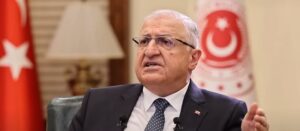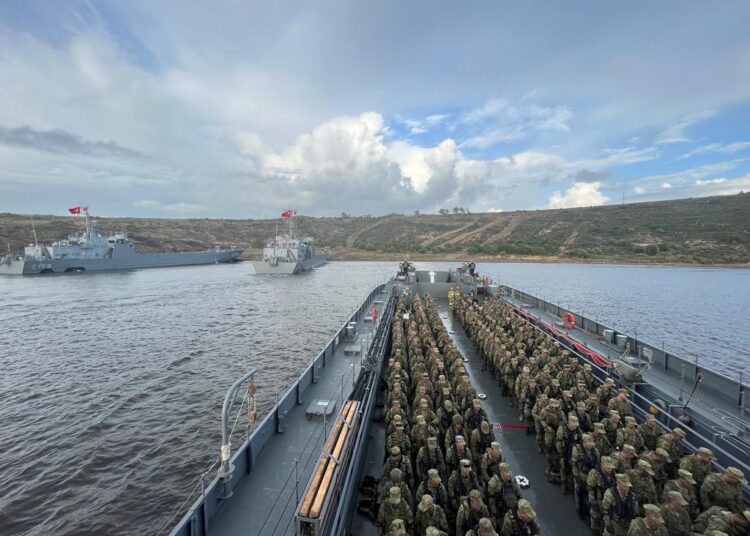Abdullah Bozkurt/Stockholm
In an official report issued by Turkey’s Ministry of Defense outlining the country’s policies concerning the European Union’s defense strategies, Turkey reaffirmed its commitment to preventing the EU from playing a fundamental role in shaping and directing defense and military policies on the continent.
The 108-page report, reviewed by Nordic Monitor, reveals Turkey’s objectives and military posture in other countries. Signed by Defense Minister Yaşar Güler, the report emphasizes that NATO must remain the principal entity in addressing the security needs of the European Union.
Turkey, a member of NATO but not of the EU, seeks to exert greater influence over Europe’s defense policies by leveraging its NATO membership benefits, including its veto power. Güler said in the document that Turkey supports strengthening ties between NATO and the EU but will act to ensure that NATO maintains its leading role in such cooperation.
The report illuminates Turkey’s ambitions, encapsulated in the phrase “Turkey’s Century” by President Recep Tayyip Erdogan. According to Güler, Turkey has already attained the status of a global actor by deploying its military and defense assets in countries such as Libya, Azerbaijan, Qatar, Somalia, Kosovo and Bosnia-Herzegovina.
Turkey’s motive for distancing itself from the EU’s goal of greater independence in security and defense policies stems from growing divergences on key issues that are of great importance to both Turkey and the EU.
Excerpts from the report that highlights Turkey’s goal of preventing the EU from becoming the lead actor in the formulation of defense and security policies in Europe:
Although the EU recognizes Turkey as a country of strategic importance, it has identified certain actions by the Turkish government as threats to regional peace, security and stability, as highlighted in multiple reports by various EU institutions in recent years. This includes Turkey’s illegal activities in Cyprus, an EU member state, which has been divided into Turkish and Greek-controlled zones since a Turkish military intervention in 1974.
Another concern for the EU is Turkey’s arming of factions in Libya and its unilateral actions, some of which are considered violations of the UN sanctions regime. These actions undermine the EU’s Operation IRINI, which is tasked with enforcing a UN arms embargo on Libya in international waters under UNSC resolutions adopted in 2016 and 2020 and has been operational since March 31, 2020.

Turkey claimed that Operation IRINI was unbalanced and disproportionately targeted Turkish-backed factions in Libya. Additionally, Turkey’s military and defense agreements with the Libyan government as well as agreements on the delimitation of maritime zones were deemed to be threats to the EU’s common security and defense policy.
Turkey’s assertive military posture in the eastern Mediterranean and Aegean over disputed sovereign zones, while somewhat moderated in recent years, remains a primary source of contention between Turkey and the EU. This is particularly evident in violations of the rights of EU member states Greece and Cyprus.
Turkey and the EU have divergent perspectives on the Israeli-Hamas conflict, which escalated following the massive attack by Hamas armed factions on Israeli military and civilian targets on October 7. While the EU lists Hamas as a terrorist organization, Turkey views Hamas militants as liberators defending their homeland against Israeli occupation.
Although Turkey aligns with the EU in condemning the Russian invasion of Ukraine and expressing commitment to the sovereignty and territorial integrity of Ukraine, it deviates from the EU by assisting Russia in circumventing Western sanctions and serving as a safe haven for Russian funds and oligarchs.

The Erdogan government’s complicity with organized crime syndicates, drug traffickers and money launderers—many of whom have sought refuge in Turkey and acquired Turkish citizenship in recent years—poses a significant threat to EU security.
A recent report by the European Union Agency for Law Enforcement Cooperation (Europol) has unequivocally affirmed that during President Erdogan’s 22-year time in office, Turkey has metamorphosed into a hub for significant criminal syndicates, posing a serious threat to the safety and security of Europe.
The EU is additionally concerned about the Turkish government’s interference in the domestic affairs of its member states. This interference includes the targeting and surveillance of journalists and activists critical of the Erdogan regime, the mobilization of pro-Turkish diaspora groups in European capitals for political purposes and a broad Turkish disinformation and influence campaign targeting the EU.
While many of these divergences also pose challenges for the US, Turkey perceives its position within the US-led NATO alliance as stronger than with the EU, leveraging its membership privileges to advance national objectives to varying degrees. Turkey’s prolonged delaying tactics regarding Sweden and Finland’s NATO membership applications serve as a case in point.
By wielding its veto power during the initiation of membership talks and employing delaying tactics for the final ratification of the accession protocols of Sweden and Finland in its parliament, the Erdogan government effectively imposed its will on several issues. This includes the lifting and/or easing of arms embargoes on Turkey’s military imports from the West.
Turkey’s influence within the EU, as a candidate country, is not equivalent to its influence within NATO. Consequently, its strategic objective remains the undermining of NATO-EU cooperation schemes and preventing the EU from assuming a dominant role in the continent’s security and defense policies. This stance was reiterated in the Turkish Defense Ministry’s 2024 report.












